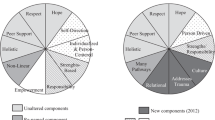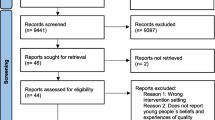Abstract
Purpose
Individual placement and support (IPS) is an evidence-based supported employment intervention. Quality of IPS implementation is assessed using a validated fidelity scale. Previous studies found a positive association between fidelity and employment outcomes at a single time-point. This study examines the longitudinal associations between IPS fidelity scores and employment outcomes.
Methods
We examined fidelity and employment outcome data for 27 IPS programs in the Netherlands providing IPS. These programs received at least one fidelity assessment and reported quarterly employment outcomes for at least one year to a central registry between 2014 and 2019. We first examined changes over time for fidelity and employment outcome. Then we analyzed the longitudinal associations between the quarterly employment outcomes and the IPS fidelity assessments on multiple time-points using a mixed-model analysis for the 17 programs with at least two fidelity assessments.
Results
Both IPS fidelity and employment outcomes improved over time, with the largest improvement in employment outcomes achieved after 18 months of implementation. We found a significant positive longitudinal association between IPS-fidelity and employment.
Conclusions
Improvement of fidelity is associated with improvement of employment outcomes over time. Future research should be focused on the improvement of specific elements of IPS implementation and their influence on employment outcomes.



Similar content being viewed by others
References
Dunn EC, Wewiorski NJ, Rogers ES (2008) The meaning and importance of employment to people in recovery from serious mental illness: results of a qualitative study. Psychiatry Rehabil J 32(1):59–62
Michon H, van Busschbach JT, Stant AD, van Vugt MD, van Weeghel J, Kroon H (2014) Effectiveness of individual placement and support for people with severe mental illness in the Netherlands: a 30-month randomized controlled trial. Psychiatry Rehabil J 37(2):129–136
Kortrijk HE, Mulder NL, Kamperman AM, van Weeghel J (2018) Employment rates in flexible assertive community treatment teams in the Netherlands: an observational study. Commun Ment Health J 55(2):350–359. https://doi.org/10.1007/s10597-018-0233-0
Nugter MA, Engelsbel F, Bähler M, Keet R, van Veldhuizen R (2016) Outcomes of FLEXIBLE Assertive Community Treatment (FACT) implementation: a prospective real life study. Commun Ment Health J 52(8):898–907
Van Hoof F, Knispel A, Hulsbosch L, de Lange A, Michon H, Kroon H (2017) Landelijke Monitor Ambulantisering en Hervorming Langdurige GGZ 2017 (National monitor Deinstitutionalization and reform of long term mental health care 2017). Utrecht: Trimbos-instituut. https://assets.trimbos.nl/docs/3c0ea839-ee7c-4427-b393-8e7819afa323.pdf
Karpov B, Joffe G, Aaltonen K, Suvisaari J, Baryshnikov I, Näätänen P, Heikkinen M (2017) Level of functioning, perceived work ability, and work status among psychiatric patients with major mental disorders. Eur Psychiatry 44:83–89
Suijkerbuijk YB, Schaafsma FG, van Mechelen JC, Ojajärvi A, Corbière M, Anema JR (2017) Interventions for obtaining and maintaining employment in adults with severe mental illness, a network meta-analysis. Cochrane Database Syst Rev 9:CD011867. https://doi.org/10.1002/14651858.CD011867.pub2
Boardman J (2011) Social exclusion and mental health–how people with mental health problems are disadvantaged: an overview. Mental Health Soc Inclus 15:112–121
Elraz H (2018) Identity, mental health and work: how employees with mental health conditions recount stigma and the pejorative discourse of mental illness. Hum Relat 71(5):722–741
Becker DR, Drake RE (2003) A working life for people with severe mental Illness. Oxford University Press, New York
Drake RE (in press) IPS International: special issue. Psychiatric Rehabil J
Brinchmann B, Widding‐Havneraas T, Modini M, Rinaldi M, Moe CF, McDaid D, Mykletun A (2019) A meta‐regression of the impact of policy on the efficacy of Individual Placement and Support. Acta Psychiatr Scand
Metcalfe JD, Drake RE, Bond GR (2017) Economic, labor, and regulatory moderators of the effect of individual placement and support among people with severe mental illness: a systematic review and meta-analysis. Schizophr Bull 44(1):22–31
Modini M, Tan L, Brinchmann B, Wang MJ, Killackey E, Glozier N, Harvey SB (2016) Supported employment for people with severe mental illness: systematic review and meta-analysis of the international evidence. Br J Psychiatry 209(1):14–22
Bond GR, Drake RE (2019) Assessing the fidelity of evidence-based practices: History and current status of a standardized measurement methodology. Admin Policy Ment Health Ment Health Serv Res. https://doi.org/10.1007/s10488-019-00991-6
Durlak JA, DuPre EP (2008) Implementation matters: a review of research on the influence of implementation on program outcomes and the factors affecting implementation. Am J Community Psychol 41(3–4):327–350
Bond GR, Peterson AE, Becker DR, Drake RE (2012) Validation of the revised individual placement and support fidelity scale (IPS-25). Psychiatric Serv 63(8):758–763
Hutchinson J, Gilbert D, Papworth R, Boardman J (2018) Implementing supported employment. Lessons from the making IPS work project. Int J Environ Res Public Health 15(7):1545–1561
Bond GR, Drake RE, Becker DR, Noel VA (2016) The IPS learning community: a longitudinal study of sustainment, quality, and outcome. Psychiatric Serv 67(8):864–869
Kim SJ, Bond GR, Becker DR, Swanson SJ, Langfitt-Reese S (2015) Predictive validity of the individual placement and support fidelity scale (IPS-25): a replication study. J Vocat Rehabil 43(3):209–216
Lockett H, Waghorn G, Kydd R, Chant D (2016) Predictive validity of evidence-based practices in supported employment: a systematic review and meta-analysis. Mental Health Rev J 21(4):261–281
Van Weeghel J, Bergmans C, Couwenbergh C, Michon H, de Winter L (2019) Individual placement and support in the Netherlands: past, present, and future directions. Psychiatr Rehabil J. https://doi.org/10.1037/prj0000372
Van Veldhuizen JR (2007) FACT: a dutch version of ACT. Commun Ment Health J 43:421–433
Singh SP, Wright C, Burns T, Joyce E, Barnes TRE, Singh S, Burns T (2003) Developing early intervention services in the NHS: a survey to guide workforce and training needs. Psychiatr Bull 27(7):254–258
Becker DR, Swanson SJ, Reese SL, Bond GR, McLeman BM (2015) Supported employment fidelity review manual. A companion guide to the evidence-based IPS Supported Employment Fidelity Scale. 3rd Edition, December 2015. Retrieved at 18–6–2019 through https://ipsworks.org/wp-content/uploads/2017/08/ips-fidelity-manual-3rd-edition_2-4-16.pdf
IPS Employment Center (2019) IPS quarterly employment reporting form. Retrieved at 10–14–2019 through https://ipsworks.org/wp-content/uploads/2018/01/IPS-Learning-Community-Outcomes2018.pdf
Areberg C, Björkman T, Bejerholm U (2012) Experiences of the individual placement and support approach in persons with severe mental illness. Scand J Caring Sci 27(3):589–596
Scott M, Falkmer M, Girdler S, Falkmer T (2015) Viewpoints on factors for successful employment for adults with autism spectrum disorder. PLoS ONE 10(10):e0139281
Sveinsdottir V, Bull HC, Evensen S, Reme SE, Knutzen T, Lystad JU (2019) A short history of individual placement and support in Norway. Psychiatr Rehabil J. https://doi.org/10.1037/prj0000366
Corbière M, Brouwers E, Lanctôt N, van Weeghel J (2014) Employment specialist competencies for supported employment programs. J Occup Rehabil 24(3):484–497
Ellenkamp JJ, Brouwers EP, Embregts PJ, Joosen MC, van Weeghel J (2016) Work environment-related factors in obtaining and maintaining work in a competitive employment setting for employees with intellectual disabilities: a systematic review. J Occup Rehabil 26(1):56–69
Streiner DL, Norman GR, Cairney J (2015) Health measurement scales: a practical guide to their development and use, 5th edn. Oxford University Press, New York
West BT, Welch KB, Galecki AT (2014) Linear mixed models: a practical guide using statistical software. CRC Press, New York
Author information
Authors and Affiliations
Corresponding author
Ethics declarations
Conflict of interest
The authors declared that they did not have a conflict of interest for this study.
Rights and permissions
About this article
Cite this article
de Winter, L., Couwenbergh, C., van Weeghel, J. et al. Fidelity and IPS: does quality of implementation predict vocational outcomes over time for organizations treating persons with severe mental illness in the Netherlands?. Soc Psychiatry Psychiatr Epidemiol 55, 1607–1617 (2020). https://doi.org/10.1007/s00127-020-01890-0
Received:
Accepted:
Published:
Issue Date:
DOI: https://doi.org/10.1007/s00127-020-01890-0




